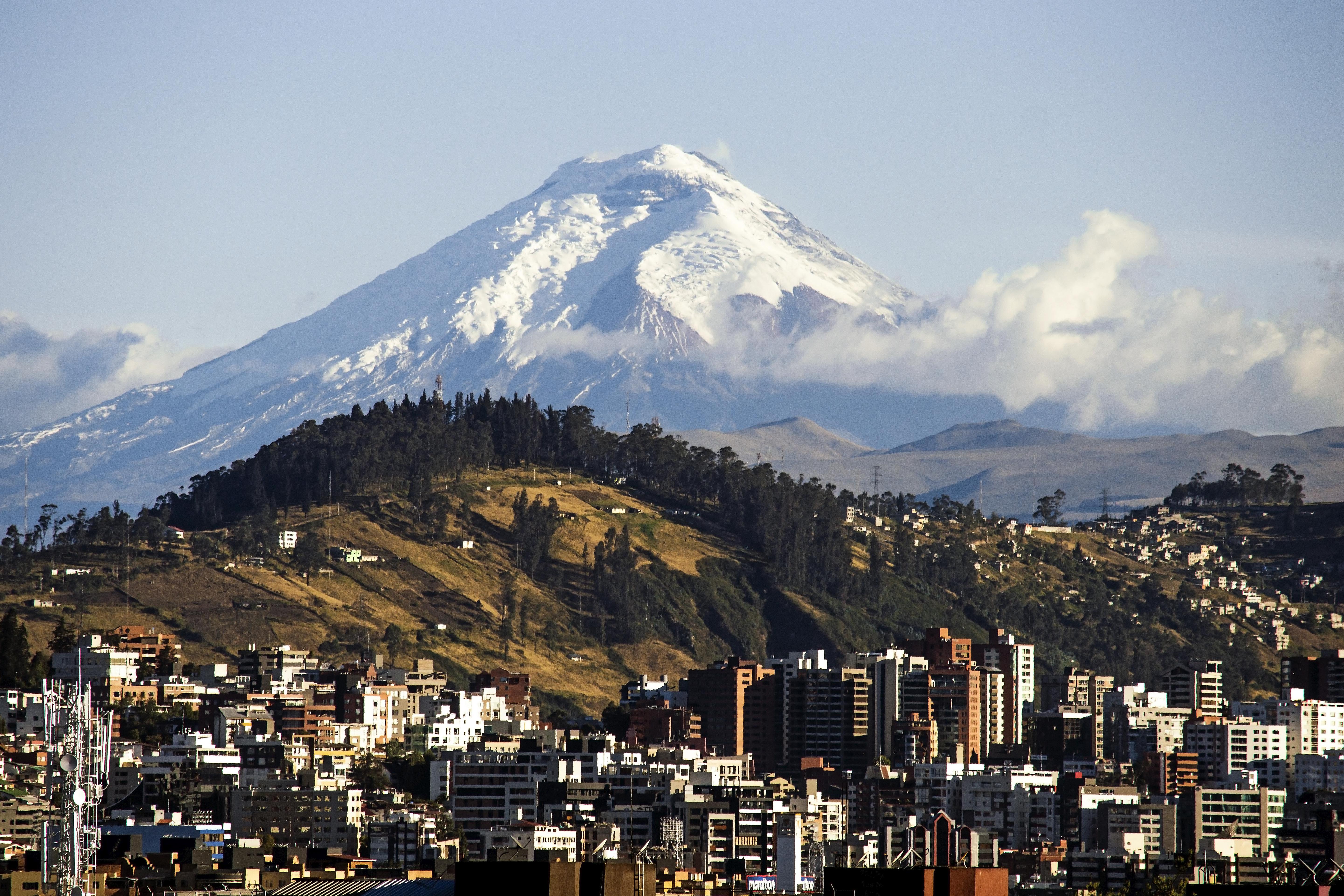Quito, the capital of Ecuador, is an Andean city 9,300 feet above sea level, squeezed into a narrow valley fifteen miles south of the equator. On the west side, you can take the Teleférico up to the shoulder of the Pichincha volcano and step out of your gondola onto an alpine landscape at an elevation of more than 13,000 feet.
Looking down at the urban area from above the tree line reminds me of cities closer to the poles than to the equator—Bergen, Cape Town, or even Anchorage. But unlike those other locations, Quito is not a port, and its cityscape is not set against a background of bright blue. Rather, the city spreads like an elongated flow of white and beige concrete poured between green ridges that hem it in. It’s a low-slung city, in which tallest spire is still the steeple of the cathedral built at the turn of the twentieth-century. It all looks diminutive from above. Across the valley rises Parque Metropolitano, the city’s green, forested lung. If the clouds permit, you can also see a series of snowcapped conical volcanoes in the distance.
Those cones remind you that you are standing on an active volcano. In 1660, the last major eruption of Pichincha spewed a massive column of ash into the air, plunging Quito—which was founded in the previous century by Spanish conquistadors on an earlier Inca site—into darkness and blanketing it with more than a foot of debris. After centuries of dormancy, Pichincha stirred again in 1981, and again in 1999, both times raining ash on the capital. So too, to a lesser degree, did a 2015 eruption of Cotopaxi, a volcano fifty miles distant, one of the peaks visible from the top of the Teleférico. “One hundred miles from the snows of Cotopaxi” is where H.G. Wells set his 1904 short story “The Country of the Blind,” the tale of a pristine, fertile valley sealed off from the rest of Ecuador by a huge fictional eruption, “the stupendous outbreak of Mindobamba, when it was night in Quito for seventeen days.”
Wells’ text gets a sizable nod in Poso Wells, the second novel by Quito-based Ecuadorian writer Gabriela Alemán. Near the end of Poso Wells, a similar volcano threatens to erupt. Birds fall from the sky, sulphurous gases emerge from the peak. Key characters in the story—four aged men from an ancient civilization whose members have all gone blind—fall to the ground and wait for the end of the world. The blind men are refugees from Wells’s story, but in Alemán’s imagination, the creations of the English writer are no longer isolated or exotic, rather they roam Ecuadorian countryside, always up to no good. The malevolent refugees are connected to the disappearance of a series of several women from a squatter settlement, and to attempts by a multinational mining interest, in league with corrupt Ecuadorian politicians, to despoil the lush landscape from which their ancestors came.
In this “mouth of the fucking devil,” forgotten by authorities, except during election years, a demagogic presidential candidate and his closest lieutenants perish in a freak accident involving a campaign speech, a microphone, an electric spark, and the candidate’s bladder overflowing with urine from too much whiskey and beer. When his surviving top-level acolyte, a millionaire next in line for the presidency, vanishes, legions of soldiers, police, and journalists are dispatched to look for him. In contrast, no official attention is paid to the disappearances of poor women in the same settlement, though they’ve been disappearing for years. Reports of the disappearances molder, untouched in the archives of the police. This scandal lying at the heart of the book, counterpoised to the high-level intrigue—a puzzle that one principled reporter and one determined local woman in Poso Wells set out to solve.
But Poso Wells also offers scenes set in the country’s cloud forest, in between the lowlands and the volcanic massifs, where golden crowed quetzals survive in what is left of their habitat, where even the cuyes (domestic guinea pigs raised as food) can sense the evil of certain visitors, and where the local villagers defend their lands.
Interspersed with the narrative are fragments of poetry, not poetic description but poems in several genres, long and short. They are declaimed by a pair of characters on a bed, or found on discarded scraps of paper, palimpsests of verse and soda-bottle stains. The mashup of genres and geographies is typical of Gabriela Alemán, about whom the Argentine writer Pedro Mairal has said, “In Bogotá, where I met her over mojitos and spiced canelazos, I watched her dance. I saw right away that within the harmony of her movements there was something that threatened to come apart. She looked like she’d fall flat on her back but she didn’t, she kept on dancing. Sometimes she writes like that—she does something unexpected, things fly apart, she leaps into the void, and you think there’s no way she can pull this off – but no, everything fits together, falls into place, flows.”
In 2007, Alemán was chosen as one of the thirty-nine Latin American writers under thirty-nine that everyone should read, the selection was based on her first novel, Body Time (set in New Orleans, where she studied for a doctorate in Latin American film), Poso Wells, and three books of short stories. Since then she has published two more books of short stories and another novel, edited several anthologies, and co-founded a print and digital press in Quito, Ediciones Fakir.
Ediciones Fakir has its office in the historic center of the city and its mission is to explore how to identify audiences for Ecuadorian writing in the twenty-first century. As Alemán explains, “Ecuador is not a country that prides itself on its reading habits, so one of our main concerns is ‘spreading’ the love of books. To do that we try to make very affordable books and tap into established genres whose Ecuadorian practitioners aren’t well known. Last year we put out an anthology of horror stories from the nineteenth century, and this year it’s going to be Ecuadorian sci-fi. Ecuador doesn’t have a tradition of graphic novels, so one of our collections concentrates on those. There are also a number of very good books that are out of print or have disappeared from the canon, and we are doing an archeology of sorts to attempt to rewrite it.” These include the work of the poet and short story writer César Dávila Andrade (1918-1967), whom they consider to be the preeminent Ecuadorian writer of the 20th Century, though he is far from a household name. Andrade was known to his friends as “Fakir” on the basis of both his skeletal build that suggested a religious ascetic, and a certain tendency toward the occult—hence the name of the press, in his honor.
Alemán’s personal tastes in literature vary widely, from Latin American writers of many stripes to Toni Morrison, Karel Capek, and Ursula LeGuin. Her own oeuvre is equally eclectic. Her father was an Ecuadorian diplomat, which is why she was born in Brazil and grew up in a variety of cities of Latin America and Europe. Humo (Smoke), her third novel, published in 2017, is a historical fiction set in the rivers, jungles, deserts, and cities of Paraguay. Her short stories trot across borders, but Alemán never forgets her roots. The stories in her collection Albúm de familia (Family Album, 2010) feature characters from Mexico, the U.S., Puerto Rico, Germany, Argentina, and more, yet every story has a connection to the country that one narrator calls “the Middle of the World.” In one, John Wayne Bobbitt (whose penis, severed by his wife Lorena, figured in the 1993 U.S. tabloid sensation of the year) shows up in Buenos Aires in the arms of an Argentine ex-actress. Another called “Superheroes” revolves around El Santo, the wildly popular Mexican wrestler, comic-book superhero, and film actor of the 1940s-‘80s, but another of Alemán’s dogged journalist characters tracks down the key to his appeal in a mountain village in the north of Ecuador, where an ex-girlfriend of the wrestler (Venezuelan by birth) has chosen to settle for the rest of her life. “Whoever embodies the myth becomes it,” the journalist concludes. “The mechanism is perfect; the gearing, precise; the house of cards, fragile. And the story? Who cares? It can pass for perfect.”
Translation also tries to pass for perfect while playing down the fact that it’s a kind of sleight of hand. The challenge of translating Poso Wells began with the title, the name of the squatter settlement. Poso is an unusual word in Spanish, echoing el pozo (the well), but actually meaning “sediment.” “Wells” of course refers to H.G., whose story Alemán read at age fourteen, amazed to find that one of her favorite English writers had set a story in her country. Much later, packing for one of her many moves from place to place, she found the book, reread it, and decided she had do something that would make use of it.

But puzzles like these are also what makes literary translation so enjoyable, and for this book I had the collaboration of an author who frequently translates from English to Spanish, so our conversations about these and other mysteries were enriching for us both. She compares it to the experience of a writer friend who translates his own work while he’s writing, “so he can see whether what he’s saying makes sense.” In the end, she says, “It was like reading my own novel as if someone else had written it.”
And, as a matter fact, there are certain fragments of her book that someone else did write. The Mexican poet character is named Benito del Pliego, and his poems are the creations of a real person by that name, not a Mexican but a Spaniard resident in North Carolina. The long poem with the pajaros/pajeros is by the Quito-born writer Andrés Villalba, who gets credited as “my friend Andrés” by the character reciting the poem, a gender-fluid poetry fan who rescues Benito from a police roundup. Ever the editor and disseminator, Alemán borrows not only from Wells, but from her friends who are poets and practitioners of Spanish-language literature around the globe. As a citizen of the Andes, perhaps it is not surprising she should have such an expansive view.
Dick Cluster writes fiction and history and does literary and academic translation from Spanish. Poso Wells will be published in English by City Lights Books in August. Cluster’s translation of Gabriela Alemán’s story “Spears” appeared in the online magazine Lunch Ticket, Winter/Spring 2018; “Superheroes” will appear in the January/February 2019 issue of Kenyon Review. His Latin American baseball fiction anthology, Kill the Ámpaya, was published by Mandel Vilar Press in 2017.
from The Paris Review https://ift.tt/2LSGW6G


Comments
Post a Comment